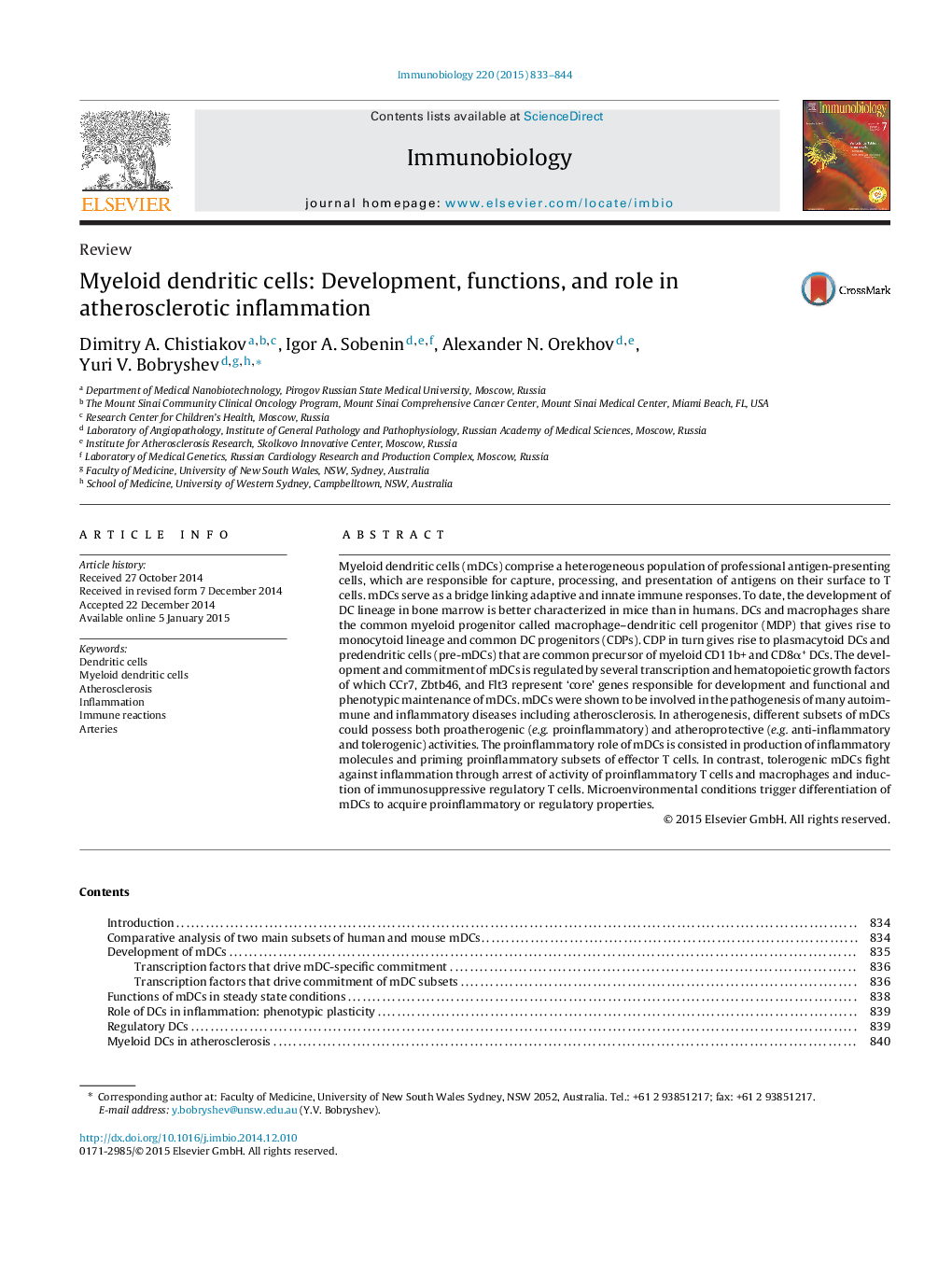| کد مقاله | کد نشریه | سال انتشار | مقاله انگلیسی | نسخه تمام متن |
|---|---|---|---|---|
| 2182921 | 1095528 | 2015 | 12 صفحه PDF | دانلود رایگان |
• Myeloid dendritic cells (mDCs) serve as a bridge linking adaptive and innate immune responses.
• The development and commitment of mDCs is regulated by several transcription and hematopoietic growth factors of which CCr7, Zbtb46, and Flt3 represent ‘core’ genes responsible for development and functional and phenotypic maintenance of mDCs.
• mDCs were shown to be involved in the pathogenesis of many autoimmune and inflammatory diseases including atherosclerosis.
• In atherogenesis, different subsets of mDCs possess both proatherogenic (e.g. proinflammatory) and atheroprotective (e.g. anti-inflammatory and tolerogenic) activities.
Myeloid dendritic cells (mDCs) comprise a heterogeneous population of professional antigen-presenting cells, which are responsible for capture, processing, and presentation of antigens on their surface to T cells. mDCs serve as a bridge linking adaptive and innate immune responses. To date, the development of DC lineage in bone marrow is better characterized in mice than in humans. DCs and macrophages share the common myeloid progenitor called macrophage–dendritic cell progenitor (MDP) that gives rise to monocytoid lineage and common DC progenitors (CDPs). CDP in turn gives rise to plasmacytoid DCs and predendritic cells (pre-mDCs) that are common precursor of myeloid CD11b+ and CD8α+ DCs. The development and commitment of mDCs is regulated by several transcription and hematopoietic growth factors of which CCr7, Zbtb46, and Flt3 represent ‘core’ genes responsible for development and functional and phenotypic maintenance of mDCs. mDCs were shown to be involved in the pathogenesis of many autoimmune and inflammatory diseases including atherosclerosis. In atherogenesis, different subsets of mDCs could possess both proatherogenic (e.g. proinflammatory) and atheroprotective (e.g. anti-inflammatory and tolerogenic) activities. The proinflammatory role of mDCs is consisted in production of inflammatory molecules and priming proinflammatory subsets of effector T cells. In contrast, tolerogenic mDCs fight against inflammation through arrest of activity of proinflammatory T cells and macrophages and induction of immunosuppressive regulatory T cells. Microenvironmental conditions trigger differentiation of mDCs to acquire proinflammatory or regulatory properties.
Myeloid dendritic cells (mDCs) comprise a heterogeneous population of professional antigen-presenting cells, which are responsible for capture, processing, and presentation of antigens on their surface to T cells. The proinflammatory role of mDCs is consisted in production of inflammatory molecules and priming proinflammatory subsets of effector T cells. In contrast, tolerogenic mDCs fight against inflammation through arrest of activity of proinflammatory T cells and macrophages and induction of immunosuppressive regulatory T cells. Microenvironmental conditions in atherosclerotic lesions trigger differentiation of mDCs to acquire proinflammatory or regulatory properties.Figure optionsDownload as PowerPoint slide
Journal: Immunobiology - Volume 220, Issue 6, June 2015, Pages 833–844
